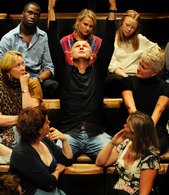SITE GUIDE
SEARCH
REVIEWS
REVIEW ARCHIVES
ADVERTISING AT CURTAINUP
FEATURES
NEWS
Etcetera and
Short Term Listings
LISTINGS
Broadway
Off-Broadway
NYC Restaurants
BOOKS and CDs
OTHER PLACES
Berkshires
London
California
New Jersey
DC
Connecticut
Philadelphia
Elsewhere
QUOTES
TKTS
PLAYWRIGHTS' ALBUMS
LETTERS TO EDITOR
FILM
LINKS
MISCELLANEOUS
Free Updates
Masthead
Writing for Us
A CurtainUp  London Review
London Review
 London Review
London ReviewThe Author
|
Society is defined by its edges, not its centre.— Tim
|

Tim Crouch centre (Photo: Stephen Cummiskey) |
A story emerges of a play written about violence and abuse. We hear of the research done by the playwright in the name of dramatic realism. He tells us that he accessed porn sites, playing videos of child abuse. We are told the effect playing an abuser has had on Vic, one of the actors, as he "gets into his part". We hear from Esther the actress, a grown woman who plays the 14 year old girl who is sexually abused. As they tell their stories, they ask solicitously whether we are ok with it. A woman leaves early on, she is part of the show. Is this a walk off part? Others leave later but we feel this is not staged. I watch as a woman opposite me wrinkles up her nose in distaste but she doesn't leave.
What Tim Crouch achieves is to get the audience to think about their participation in cruelty the name of art. His point isn't the obvious one of the audience as voyeurs but the dehumanising nature of involvement in terrible violence and sexual abuse of children when we view it or present it as entertainment. There is the harrowing description of the beheading of a hostage or the beating of a child by her father. The woman actor tells us the audience ask the same question over and over, "What's the blood made out of?" They ask about the technique so they can rationalise that what they have seen has been created like a magic trick. It is not real and they ask how it was done rather than talk about how it made them feel. It is the same as Adrian who introduces the piece with the excitement of being in the theatre. But The Author is also about the immersion of the writer and the actors in their roles, what they have to do to be convincing and how this affects them and their friends and families and behaviour.
And I suppose too The Author begs the question why are plays written about these issues which used to be unmentionable. The MP and Editor of The Pall Mall Gazette, WT Stead was prosecuted and imprisoned when, in order to expose the sex trade in Victorian times, he bought a 13 year old child from her chimney sweep father. How does showing simulated child rape on stage change anything? How does awareness of the beheading of a hostage change public opinion where it matters, where it will make a difference?
Tim Crouch is to be commended for extending this debate and for his original way of involving the audience in the staging of The Author without a stage. We are told by Esther that the audience found the piece so powerful because of the research the drama professionals had done. What is the price paid for this authenticity?
|
Subscribe to our FREE email updates with a note from editor Elyse Sommer about additions to the website -- with main page hot links to the latest features posted at our numerous locations. To subscribe,
E-mail: esommer@curtainup.comesommer@curtainup.com
put SUBSCRIBE CURTAINUP EMAIL UPDATE in the subject line and your full name and email address in the body of the message -- if you can spare a minute, tell us how you came to CurtainUp and from what part of the country. |
| The Author
Written by Tim Crouch Directed by Karl James and a smith With: Tim Crouch, Adrian Howells, Vic Llewellyn, Esther Smith Lighting: Matt Drury Music and Sound: Ben and Max Ringham Running time: One hour 15 minutes with no interval Box Office: 020 7565 5000 Booking to 24th October 2009 Reviewed by Lizzie Loveridge based on 2nd October 2009 performance at the Jerwood Theatre Upstairs, Royal Court, Sloane Square, London SW3 (Tube: Sloane Square) |
|
REVIEW FEEDBACK Highlight one of the responses below and click "copy" or"CTRL+C"
Paste the highlighted text into the subject line (CTRL+ V): Feel free to add detailed comments in the body of the email . . . also the names and emails of any friends to whom you'd like us to forward a copy of this review. |
|
London Theatre Tickets Lion King Tickets Billy Elliot Tickets Mighty Boosh Tickets Mamma Mia Tickets We Will Rock You Tickets Theatre Tickets |




